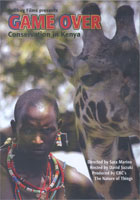
Game Over: Conservation in Kenya 2007
Distributed by Bullfrog Films, PO Box 149, Oley, PA 19547; 800-543-FROG (3764)
Produced by Michael Allder
Directed by Sara Marino
DVD, color, 44 min.
Sr. High - Adult
African Studies, Environmental Studies, Postcolonialism, Indigenous Peoples, Wildlife, Conservation
Date Entered: 12/02/2009
Reviewed by Sue F. Phelps, Washington State University, Vancouver, WAGame Over: Conservation in Kenya gives historical context to the current challenges to wildlife conservation in Kenya. Told through interviews with conservationists, most notable of whom is Richard Leaky, the history, politics and traditions that effect the current status of the wild life and Kenyan stakeholders are told with apparent impartiality. The traditional focus is on the Maasi people and their efforts to adapt to the needs of increased population and wildlife conservation in Kenya. The results of colonization, sports hunters, poachers, national parks, and tourism are discussed along with the economy of the country and the 37 million people who live there. Many positive changes are highlighted, including the Maasi Mara National Reserve, a piece of land the Maasi have designated as a wildlife preserve. Many incidents of corruption, both historical and current, are also addressed.
The film is beautifully shot with some startling footage of the wildlife. The opening shows a Maasi lion hunt, with spears as the only weapons, which is narrated by a Maasi tribesman. Subtitles are very helpful for interviews with English speakers who have an unfamiliar accent to the American ear as well as being closed captioned.
Though this film, specifically, has not won awards, it is produced by the team behind the award winning The Nature of Things, Canada's longest running documentary series, and features a spot with David Suzuki. To watch a clip from Game Over: Conservation in Kenya see the Bullfrog Films website.
This film would be a good addition to a university or college library that supports African Studies, wildlife conservation, environmental studies, or history of post colonialism. It would also be appropriate for a high school or public library.